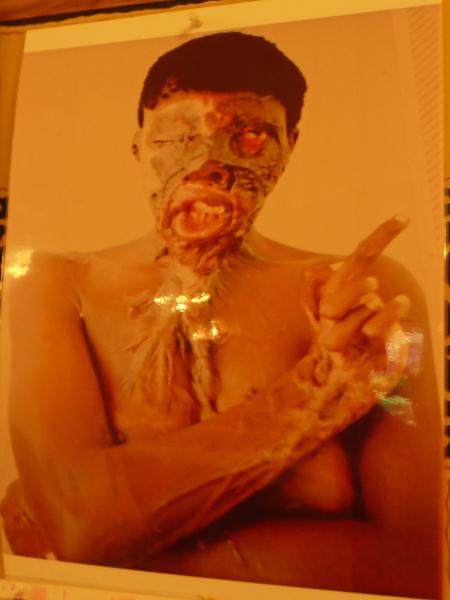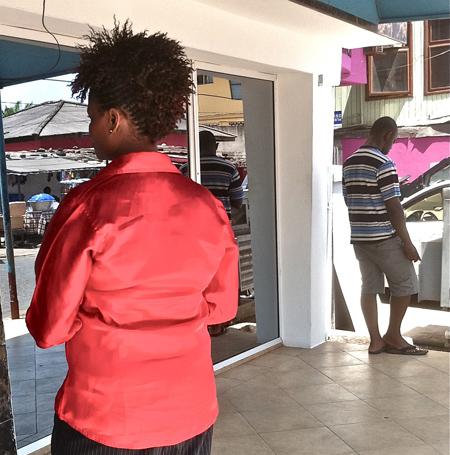
A woman injured by acid, poured on her by her husband, was a story covered in Ghana's Daily Graphic newspaper in December 2010. Photo taken from an enlargement supplied by Domestic Violence Victim Support Unit (DOVVSU) of the Ghana Police Service. Credit: Paula Stromberg
My days in West Africa are a blend of mystery, hilarity, horror and awe. I’m dialling the telephone number of a stranger, about to ask for an interview about her criminal activity that could get her blackmailed, raped or killed.
“The phone’s ringing. What do I say? She’ll be afraid.”
My contact, a gay Liberian from Buduburam Refugee Camp in Accra provided a phone number, probably via the woman’s catering business. They’ve never met but he’s sure she looks lesbian. “Tell her you want to meet women in blue jeans.”
She answers on the third ring. I explain that I am a volunteer with women’s empowerment non-governmental organizations (NGOs) in Ghana and want to interview women in blue jeans. I sound ridiculous. Fortunately, she agrees to be treated to lunch the next day and we hang up.
Within moments, I receive a text message. “Can u call pls.”
I call her again.
“Before we meet, I must know. Are you in the game?”
I choose my words carefully. “My friends advise me many things are not spoken aloud in Ghana. I am not completely sure to which game you are referring, but as a Canadian used to speaking bluntly, I will answer, ‘Yes, I am in the game.'”
* * *
The next day, I recognize her immediately at the purple-cement XXX Restaurant outside the Buduburam Refugee Camp. She is wearing blue jeans. Her nose is pierced with a gold stud and she has a flashy sense of style. Cornrows line the sides of her head and over-the-top hair extensions form a crinkly mohawk. A red line under each eyebrow matches her red satin blouse.
Around the restaurant, aggressively curious men make privacy impossible. We sprint across Cape Coast Highway to a tiny provision shop and order soft drinks. Although it isn’t a café, the proprietor extracts folding chairs and finds us a spot in the shade. This act of kindness is just one of many I experience in Ghana. We perch at the side of her shop, 10 feet from the roaring highway and keep our palms flat over our lukewarm pop bottles. Flies swarm like Armageddon.
After I promise veto power over photographs to ensure her anonymity, we settle on a pseudonym for the interview. “Rita Johnston” begins talking about her life as a refugee in a country that punishes homosexuality with 10 years in prison.
“I live in the Buduburam Refugee Camp with an aunt, my father’s sister. I consider myself Nigerian. My father was from Liberia but died when I was 10. My mother is Nigerian and went back there eight years ago because she had no money. After Mother left, my secondary school prefect here in Ghana started hugging me, rubbing and kissing me. She play with my breasts, we have fun [sex]. Along the line, I started to be a member. The school prefect gave me gifts like food, clothes and lotion. She was 27. I felt better.
“I had never dated before. I decided I like women more than men because I feel free. With men, I feel disturbed.
“Someday I might marry, but a man is only for financial help. If I have a trade like party catering, I don’t think it is necessary. I am okay. A man is a problem.
“I prefer women because I won’t get pregnant. I am a down [bottom in sex], so I want someone to look after me. I will be 26 in August 2011.”
“I like my life right now, but I want to get money. They distribute food in camp if you have a United Nations Refugee ID Card. I do not have a card.
“I learned catering at a trade school run by the UN in the refugee camp. Soon I hope to learn interior decoration with tents, banners and balloons so I can offer service for funerals, parties and weddings. Camp rent is low, 25 cedis a month [about $20], so I need another 100 cedis for living expenses, food, clothes and to invest in business. After catering my last party, I made nine cedis [about $5] profit. I can charge 120 cedis for a large wedding cake, and make profit of 30 cedis.”
“Your life sounds challenging. Are you strong enough to live as a lesbian in West Africa?”
Rita winces at the word lesbian. “We say ‘in the game.’ That is language to confuse people. It is not easy to meet other women in Ghana. It is dangerous. Everyone is against us. Besides my school prefect, I had one girlfriend, Doris, from Nigeria. We travelled to Togo and lived in the same house compound for a few months. She was an up [top] with short hair. She was very skinny, had dark complexion and was so romantic she made me forget myself.” Rita laughs, but her smile fades when I ask why they parted. Doris, like Rita’s mother, returned to Nigeria.
“Are you in physical danger if people discover you prefer being with women?”
Rita takes a fast sip of pop. “I can do what I like as long as it is hidden.”
“Will you ever return to Liberia, Rita? Ghana’s newspapers keep saying Liberian refugees should go back now the civil war is over.”
“I consider myself Nigerian. None of us have money and can’t find our families. At least in the refugee camp you have a house and can eat. Back home, people have nowhere to stay and no work.”
“What do you love?”
She smiles at the question. “My favourite foods are beans and plantain. Favourite music is blues, Bob Marley, Céline Dion and Blenda, the Ghanian female singing star. I like to go the beach, but like most people in Ghana, I do not know how to swim.”
“Rita, tell me about life if all your dreams came true.”
“I hope to meet a woman, a companion. I would like to travel, have a home, a nice place to be a lesbian. And someday when I have money, I will go to Nigeria and look for my mother.”
Just then, her mobile phone goes off, a comical honking horn, and brings an end to our interview. It is 5:30pm and darkness falls promptly at 6:10 in this country that lies near the centre of the world, the intersection of the Greenwich Meridian and the equator. I’m scared to be on my own in the dark by Buduburam Refugee Camp, where the previous week’s riots left one dead and 20 injured. There are no street lights. I flag a taxi back to central Accra.
* * *
The next day, I receive a text message from Rita.
“i think we can make real partner what u think?”
I text my reply: “Do not understand.”
Rita texts back, “I think we can make good partner like lover.”
What can I say to this desperately poor 26-year old refugee who longs to find her lost mother? Although I met Rita by claiming an interest in women in blue jeans, I text a personal U-turn in romantic taste.
Dear Rita J,
You are sweet and far too young. I am interested only in lovers 45 years or older in high heels and tight dresses. Thank you for the compliment. All the best in your career. I hope you make lots of money and never need anyone to support you. Paula
She does not reply. Three months later, I am back in Canada, and my long-distance texts to Rita’s number remain unanswered.

 Why you can trust Xtra
Why you can trust Xtra


